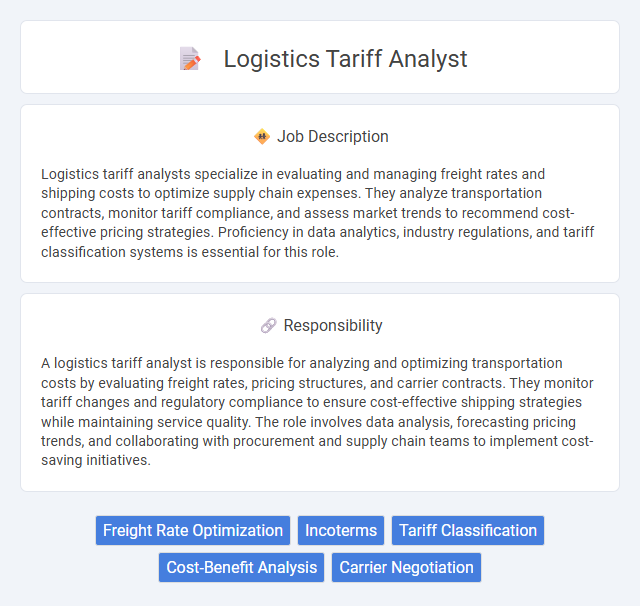
Logistics tariff analysts specialize in evaluating and managing freight rates and shipping costs to optimize supply chain expenses. They analyze transportation contracts, monitor tariff compliance, and assess market trends to recommend cost-effective pricing strategies. Proficiency in data analytics, industry regulations, and tariff classification systems is essential for this role.
Individuals with strong analytical skills and attention to detail are likely suitable for a Logistics Tariff Analyst role, as the job requires assessing complex shipping rates and regulations. Those comfortable working with data and spreadsheets, and who have a background in logistics or finance, probably adapt well to this position. People who prefer routine and structured environments are more likely to find success in this role compared to those who thrive in highly creative or unpredictable settings.
Qualification
A Logistics Tariff Analyst requires strong analytical skills and proficiency in logistics management software to evaluate shipping rates, tariffs, and transportation costs effectively. Expertise in data analysis, supply chain management, and understanding of trade regulations are essential to optimize cost structures and ensure compliance. A bachelor's degree in logistics, business, or related fields combined with experience in tariff negotiation and freight billing is highly preferred.
Responsibility
A logistics tariff analyst is responsible for analyzing and optimizing transportation costs by evaluating freight rates, pricing structures, and carrier contracts. They monitor tariff changes and regulatory compliance to ensure cost-effective shipping strategies while maintaining service quality. The role involves data analysis, forecasting pricing trends, and collaborating with procurement and supply chain teams to implement cost-saving initiatives.
Benefit
A Logistics Tariff Analyst likely benefits from maximizing cost efficiency by accurately analyzing freight rates and optimizing shipping expenses. This role probably enhances strategic decision-making through data-driven insights into tariff structures, improving overall supply chain management. Strong potential exists for career growth due to increasing demand for skilled analysts who can navigate complex logistics pricing.
Challenge
A Logistics Tariff Analyst will likely face the challenge of managing complex pricing structures and fluctuating market conditions to ensure competitive and profitable tariff models. There is a strong probability that interpreting vast amounts of data and regulatory requirements will require advanced analytical skills and attention to detail. Continuous adaptation to industry changes and technology advancements could also pose significant challenges in maintaining accurate and efficient tariff strategies.
Career Advancement
Logistics tariff analysts play a crucial role in optimizing transportation costs by analyzing freight rates and contract terms to enhance supply chain efficiency. Expertise in data analytics, regulatory compliance, and tariff negotiation paves the way for advancement into senior analyst, pricing manager, or supply chain strategist positions. Continuous professional development and proficiency in logistics software significantly increase opportunities for career growth and leadership roles within the transportation and logistics industry.
Key Terms
Freight Rate Optimization
A Logistics Tariff Analyst specializing in Freight Rate Optimization evaluates and adjusts shipping tariffs to maximize cost efficiency and improve profit margins. They analyze market trends, competitor pricing, and transportation data to develop strategic freight rate structures that reduce expenses while maintaining service quality. Proficiency in logistics software and strong analytical skills enable accurate forecasting and optimization of shipping costs across multiple transportation modes.
Incoterms
A Logistics Tariff Analyst specializes in evaluating and managing shipping costs, with a strong emphasis on Incoterms to ensure accurate allocation of freight charges and compliance with international trade regulations. Proficiency in interpreting Incoterms such as FOB, CIF, and DAP enables the analyst to optimize logistics expenses and streamline tariff structures for global supply chains. Leveraging data on tariff rates, customs duties, and transport modes, the role supports cost-effective decision-making in shipping and distribution strategies.
Tariff Classification
A Logistics Tariff Analyst specializes in accurately classifying goods according to international tariff codes such as the Harmonized System (HS) to ensure compliance with customs regulations and optimize duty costs. This role involves analyzing shipment documentation, determining appropriate tariff classifications, and maintaining updated knowledge of trade agreements and tariff changes. Expertise in tariff classification directly impacts supply chain efficiency and company profitability by minimizing risks of penalties and delays.
Cost-Benefit Analysis
A Logistics Tariff Analyst evaluates transportation and shipping rates to optimize supply chain expenses, focusing on detailed cost-benefit analysis to identify the most efficient tariff structures. By analyzing historical shipment data, market trends, and carrier contracts, they recommend pricing strategies that balance cost reduction with service quality. Proficiency in data analytics tools and knowledge of industry regulations enhances decision-making processes to maximize financial performance and operational efficiency.
Carrier Negotiation
A Logistics Tariff Analyst specializing in Carrier Negotiation evaluates and negotiates shipping rates and contracts with carriers to secure cost-effective transportation solutions. They analyze freight data, market trends, and carrier performance metrics to optimize tariff structures and reduce logistics expenses. Expertise in contract management and competitive benchmarking ensures the selection of reliable carriers while maintaining budget compliance.
 kuljobs.com
kuljobs.com